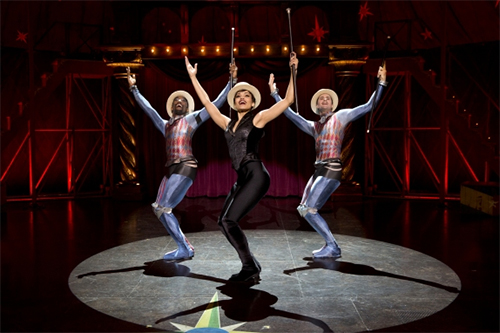Translate Page

The high-flying life of Pippin's stage manager
---
Stage managers have been described as the air-traffic controllers of the stage. That's especially true when the traffic is actually up in the air.
Such is the case with the circus-infused revival of Pippin, which continues to pack audiences into the Music Box Theatre. Calling the shots backstage is Michael J. Passaro, who as production stage manager leads the team that oversees each performance. The dog, Pippin's grandmother on a trapeze, the acrobats flinging themselves in all directions: They all need to be minded eight times a week.
"Essentially, we're there to make sure the show is done technically and artistically as close to the original as possible," Passaro says. "We're the eyes and ears of not only the creative team but also the producing side."
This high-flying take on Stephen Schwartz and Roger O. Hirson's 1972 musical, which follows a young prince on a quest for personal fulfillment, has been lauded for reimagining the show, adding a new, unsettling ending along with the circus elements. Passaro's résumé makes him the ideal candidate to steer this particular ship. He made his Broadway debut stage managing another musical heavy on physical dexterity, the Andrew Lloyd Webber roller-skating spectacular Starlight Express. Since then, he's worked on 25 Broadway shows, ranging from Angels in America to A Year With Frog and Toad to Dance of the Vampires.
His three-person Pippin crew is relatively small; large-scale musicals like Spider-Man: Turn Off the Dark will often have twice as many team members. But the snug Music Box, which often houses plays instead of musicals, could scarcely hold more people.
"This is a very intimate place to stage a musical, which is terrific," Passaro says. "But the catch is that the backstage space is really tight." So, like so many cramped New Yorkers, the Pippin team has built a loft space: Passaro typically "calls" the show, as the saying goes, from a backstage perch about eight feet in the air.
This wouldn't be his first choice---"You can connect with the energy better when you're on the floor"---but it does give him an appropriate vantage point for seeing performers from an unusually broad variety of performance styles. "Many of the acrobats have never done a Broadway show and, frankly, never aspired to do a Broadway show," Passaro says.
Particularly as new performers come in and out of the cast, he adds, "the complexity in Pippin is the safety element." (The two leads were both replaced recently, and the taxing physical demands have resulted in a series of circus performers cycling through the ensemble.) "We can't just put what one acrobat does onto another performer because the bodies are so specific."
As a result, each new acrobat rehearses for three or four weeks before performing, which is double the usual length of chorus rehearsals. "And even then, it takes another six weeks before they feel fully integrated in the show," Passaro says.
Keeping tabs on all these comings and goings---not to mention the fireproof costumes and unicycles and flaming torches---means he needs to be at the Music Box several hours before curtain. Thursdays and Fridays are typically spent rehearsing new cast members and understudies, and the result is a lot of 12-hour days.
Passaro passes this information along when he teaches stage management at Columbia University, and it has the expected effect on his starstruck pupils. "Sometimes I find that younger stage managers come to worship at the shrines of Broadway musicals, if you will," he says. "But that doesn't last forever, and they can get bored. I tell them that you have to find something in the show to fall in love with every single performance, eight times a week."
---
Eric Grode is a freelance arts writer and a professor at Syracuse University's Goldring Arts Journalism Program
Photo by Joan Marcus